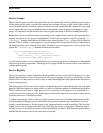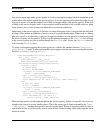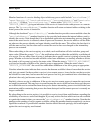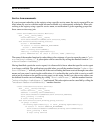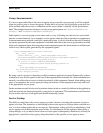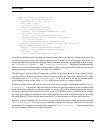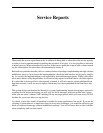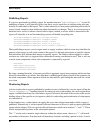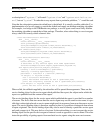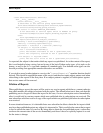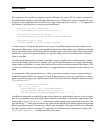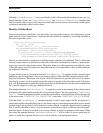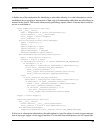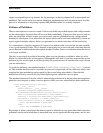
Service Reports
48
Publishing Reports
If a service agent needs to publish a report, the member function "publishReport()"isused.In
publishing a report, it will generally be the case that a service agent does it without caring who may
actually be subscribed to that report. This is often referred to as anonymous publishing and results in
a more loosely coupled system which can adjust dynamically to changes. That is, it is not necessary to
hardwire into a service to whom it should send a report, instead, a service which is interested in the
report will subscribe to it and the underlying system will handle everything else.
self.publishReport("subject.string","value")
self.publishReport("subject.integer",12345)
self.publishReport("subject.float",1.2345)
self.publishReport("subject.list",[1,2,3,4,5])
self.publishReport("subject.dict",{"one":1,"two":2})
When publishing a report, a service agent needs to supply a subject which in some way identifies the
purpose of the report, as well as the content of the report. It is through subscription to specific subjects
that subscribers will indicate their interest in specific reports. The subject name assigned to a report
can have any value, but it is suggested that a hierachical naming convention be used. That is, use one
or more name components, where each component is separated by a period.
heartbeat
news.local.sanitation
news.domestic.politics
notifications.shutdown
By using a naming hierarchy, it becomes possible to aggregate reports into groupings which can then
be easily subscribed to as a whole. Note that there is nothing special about a period as the separator for
the name components. Other separators which are often used for performing the same task are a slash
or a colon.
Monitoring Reports
A desire to subscribe to reports published by another service is indicated by a service agent calling the
"monitorReports()" member function. In setting up such a subscription, the service agent must
supply a callback function to be called when a report is received, the name of the service or the service
binding object of the specific service agent to which it is subscribing and an indication of what reports
it is interested in.
In the simplest case, a subscription can supply the exact same subject name under which a report is
published. Alternatively, it can use special wildcard characters to allow it to pick up reports published
against related subjects. The two special wildcard characters which can be used are "*" and "?". These
can be incorporated anywhere in the subscription pattern.
The "?" can be used to match a single character within the subject name, where as a "*" will match
any number of characters. Note that each will match any character, including a period or slash. As such,



